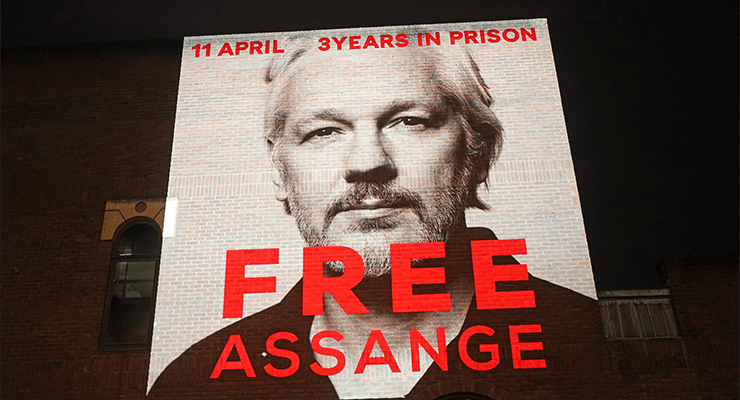
Julian Assange is in for “years and years” behind bars if a “political solution” to his legal case isn’t found soon, his lawyer says.
London-based barrister Jennifer Robinson has been carrying out a media blitz in her homeland of Australia this week, seeking to put pressure on the Albanese government to free her client.
Assange, 51, has spent the past 10 years indoors. He was detained by UK police in 2019 after having spent the previous seven years inside an embassy apartment in London.
“The reason I’m here is because we need a political solution,” Robinson told Crikey.
“This case has always been political. If there isn’t a political solution, we’ll be tied up in years and years of legal process. It could be another decade of his life, and we don’t think he’ll last that long.”
Assange’s legal team is seeking permission to appeal a UK government decision to extradite him to the US, where he’s facing 18 counts, including a spying allegation.
The US says the Australian endangered lives when his whistleblowing organisation WikiLeaks published leaked documents in 2010 and 2011 related to the Iraq and Afghanistan wars.
Assange’s supporters say the publications were legitimate works of journalism and that Assange, who is being held in London’s Belmarsh prison, shouldn’t be punished for it.
Robinson’s media appearances included a speech on Wednesday at the National Press Club in Canberra, where she told journalists present that the outcome of Assange’s case would set a precedent impacting reporters across the world.
“Julian Assange won’t be the last of your colleagues to have his life destroyed in this line of work,” she told the audience.
The UK extradition case isn’t the only Assange-related matter making its way through the courts.
A group of lawyers and journalists who have filed a lawsuit against the US Central Intelligence Agency in a New York court, alleging the spy service violated their constitutional rights by copying material from their phones when they visited Assange in 2017 and 2018, were told by a judge earlier this week the case had been adjourned until February next year.
At the time, Assange was hiding out in the Ecuadorian embassy in London, seeking to avoid extradition to Sweden where authorities wanted to question him over an allegation of rape, which he denied.
That preliminary investigation was eventually scrapped in 2019 after the Swedish Prosecution Authority deemed that while the complainant had “submitted a credible and reliable version of events … the evidence has weakened considerably due to the long period of time that [had] elapsed” since the alleged 2010 incident.
The people who filed the US lawsuit alleged they were forced to surrender their phones and laptops when they visited Assange in the embassy, and that a Spanish security firm hired by Ecuador had copied the information on the devices and handed it to the CIA, without the embassy’s knowledge.
Robinson told Crikey the same kind of alleged phone-spying referenced in the lawsuit had happened to her as well.
“I’ve taken my own case against the British government for spying on me, which was resolved successfully with a friendly settlement where the UK admitted my rights had been violated,” she said.
European Court of Human Rights documents from June show Robinson was awarded €1000 for costs and expenses in relation to her suit against the UK.
“I got a small settlement, which I donated to charity,” Robinson said.
Anthony Albanese, who said before becoming prime minister that Assange’s case had dragged on for too long and that “enough is enough”, has toned down his language on the matter since taking office, telling reporters earlier this year that “not all foreign affairs is best done with the loudhailer”.
Attorney-General Mark Dreyfus told the National Press Club last week that the case against Assange had “gone on long enough”.
Robinson said her legal team was “continuing to have conversations with the government” about the case and that “we will continue to press them to do the right thing”.
She said Assange had recently suffered a “mini-stroke” and a bout of COVID-19, and that there were fears his life could be in danger if his incarceration continues.
“The key concern for us right now is Julian’s deteriorating health, and the prison conditions he will face if he’s extradited to the United States,” Robinson said.
If “enough is enough” as Albanese says, is it time to bring out the loudhailer? Let us know your thoughts by writing to letters@crikey.com.au. Please include your full name to be considered for publication. We reserve the right to edit for length and clarity.








Everyone knows Assange is both a victim, not only of a world power but . . . of deeply embedded, unaccountable organisations, departments, therein, holding psychopathic grudges against an individual, Australian citizen, that they believe may threaten their future rights to act without restraint. The UK and Australian Govt’s have not only failed Assange, but failed both our countries democratic responsibilities. FREE ASSANGE!
This has gone on for too long. It’s time that Albanese shelved the ‘quiet diplomacy’ (cough; sweep it under the carpet) and told us what exactly his government is doing about the situation.
Zero.
It can be assumed that Albo, Wong and Dreyfus have spoken with someone from the U.S. already, That could be the only reason they have all been quiet on Assange for the last 3 or 4 months.
Mark Dreyfus at his few news conferences he has had, has failed to mention that he signed a “Points of Order” Document from the U.S. that specifically states that Julian cannot be returned to Australia until at least AFTER his Espionage Trial in the U.S. has reached it’s conclusion. Dreyfus is playing both sides of the court by signing that document on the one hand and saying the matter needs to be brought to a close on the other hand.
It’s inexplicable why all journalists are not spooked & railing against the treatment of Assange. They are all vulnerable – along with the future of news publishing – if the prosecution proceeds.
Looking after their jobs – could even be blacklisted.
From day one ‘Journalists’ have been wary of, sometimes feared, and in many cases despised Julian Assange because essentially what he represents is an existential threat to their professional stock-in-trade, which is monetised information. Wikileaks, like the internet generally, is a deep philosophical and structural threat to their self-appointed and self-serving role as epistemological gate-keepers – a role that has long past its fit-for-purpose use-by date.
‘Journalism’ has for several generations now been overwhelmingly courtier to and lobbyist for State power, not a net teller of corrective truth to it. The day a critical mass of ‘the media’ gets on board any push for a ‘political solution’ to Assange’s predicament is the day this destructive leviathan of the suicidal status quo has collectively assuaged that he/Wikileaks are no longer a disruptive threat to their systemic role. That’s precisely why it ought to be resisted, however individually compassionate Robinson’s pleas may be.
By “…collectively assuaged that he…” did you mean ‘assured’?
In the middle of Ronnie Raygun’s reign, when his colleagues, aides, allies and backers were being indicted, investigated and imprisoned wholesale, there was a TV series Max Headroom – not the rubbish movie that followed.
It was based on the mistaken premise that merely revealing the Truth to the gawping public would bring an end to corruption and malfeasance in office.
Wasn’t true then, since and certainly not now.
Oh dear, how embarrassballs. Got caught halfway between ‘gauged’ and ‘assayed’.
Curse you, GrammarPendantMan.
Yeah. Unfortunately the boulevard of brave truth-to-power telling is strewn mostly with the broken dreams of the prematurely hopeful.
More power to…them, anyway, mate. They can shave their battered faces without blinking or turning away, at least.
…being that booky smartarse who dangles his superior edgakayshun prominently ‘round his neck like a gold medallion, as I (clearly) meant.
Geez, Crikes, get an edit button already, willyuz ?! ?
Can someone be charged with spying if they’re not American and have never been to America?
Don’t you know that US Law applies around the world? At least according to the Yanks.
isn’t that whole “endangered lives” nonsense based on the fact that a couple of Journals of Record accidentally (?) leaked some passwords?
In any case, the US military did more than ‘endanger’ innocent lives; they killed them and didn’t want the world to know.
In any case, the only person who really has to make any sort of personal moral reckoning with any lives that were endangered by the Wikileaks dump is Chelsea Manning. She alone made a personal choice to break a moral agreement she knowingly made with US State power, the potential moral consequences – and benefits – of which breaking she would have been well aware prior to making that choice. I think it’s worth noting that for her the jury may still be out on whether or not she regards the cost-benefit calculus as being positive, and also that how the Assange situation plays out from even here remains fundamentally important to her eventual moral self-assessment and indeed well-being. I think our duty-of-care to her remains more live and in the balance than ever.
Whistleblowers make personally life-changing choices. How the rest of us respond to them is the difference between them being life-affirming or life-destroying ones. For me the Assange case is still frightening undecided on that score, for all whose lives have been directly upended.
As for Assange’s – or any journalists’ – moral obligations…the day the State convinces any of us who have not entered into a moral agreement with it to help it keep its secrets is the day the State has recruited us to share those secrets’ ugliest moral burdens. Which is to say…lend them our personal moral imprimatur.
It was never Julian Assange’s moral responsibility to help keep Coalition secrets secret, nor Coalition operatives safe.